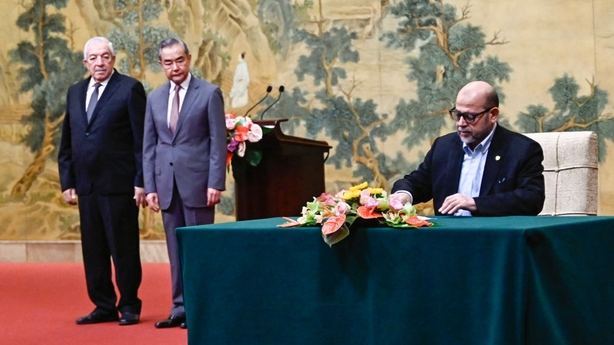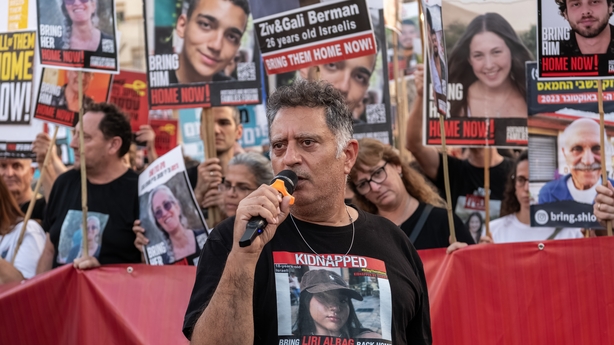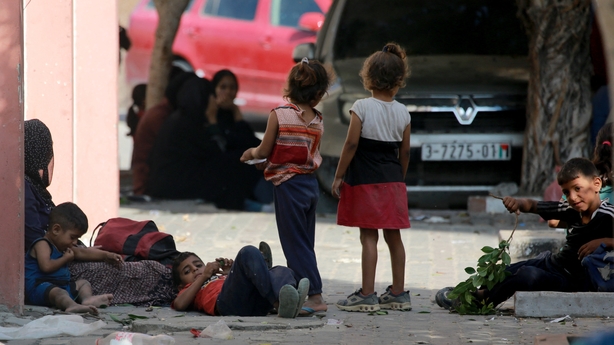Hamas has announced it had signed an agreement in Beijing with other Palestinian organisations, including rivals Fatah, to work together for "national unity", with China describing it as a deal to rule Gaza together once the war ends.
The Beijing Declaration was signed at the closing ceremony of a reconciliation dialogue among 14 Palestinian factions held in China's capital from 21-23 July, according to the Chinese Foreign Ministry.
Previous efforts by Egypt and other Arab countries to reconcile Hamas and Fatah have failed to end 17 years of power-sharing conflict that have weakened Palestinian political aspirations, and it remains to be seen whether this deal will survive the realities on the ground.
The meeting was held amid attempts by international mediators to reach a ceasefire deal for Gaza, with one of the sticking points being the "day-after" plan, how Gaza will be governed once Israel ends its war.
Israel has criticised Fatah for signing the agreement.
"Hamas and Fatah signed an agreement in China for joint control of Gaza after the war. Instead of rejecting terrorism, [Palestinian President] Mahmud Abbas embraces the murderers and rapists of Hamas, revealing his true face," Foreign Minister Israel Katz said on X.
"In reality, this won't happen because Hamas' rule will be crushed, and Abbas will be watching Gaza from afar."
The announcement comes more than nine months into a war sparked by Hamas' October 2023 attack on southern Israel, which resulted in the deaths of 1,197 people, mostly civilians, according to an AFP tally based on Israeli figures.
The militants also seized 251 hostages, 116 of whom are still in Gaza, including 44 the Israeli military said are dead.
Israel's retaliatory war in Gaza has killed more than 39,000 people, also mostly civilians, according to data from the health ministry in Gaza.
AFP correspondents today reported air strikes in Gaza city and the Jabalia refugee camp in the north of the territory, as well as Khan Younis, while the Israeli military also claimed its troops had killed militants in "aerial strikes and close-quarters combat" in Rafah in the far south.

China has sought to play a mediator role in the conflict, which has been rendered even more complex due to the intense rivalry between Hamas, which govern in Gaza, and Fatah, which partially governs in the occupied West Bank.
Israel has vowed to keep fighting until it destroys Hamas, and world powers including key Israeli backer the United States have scrambled to imagine scenarios for the governance of Gaza once the war ends.
As today's meeting wrapped up in Beijing, Mr Wang said the groups had committed to "reconciliation".
"The most prominent highlight is the agreement to form an interim national reconciliation government around the governance of post-war Gaza," Mr Wang said following the signing of the "Beijing declaration" by the factions in the Chinese capital.
"Reconciliation is an internal matter for the Palestinian factions, but at the same time, it cannot be achieved without the support of the international community," Mr Wang said.
China, he added, was keen to "play a constructive role in safeguarding peace and stability in the Middle East".
Mr Wang said China called for a "comprehensive, lasting and sustainable ceasefire", as well as efforts to promote Palestinian self-governance and full recognition of a Palestinian state at the UN.
Hamas and Fatah have been bitter rivals since Hamas fighters ejected Fatah from Gaza after deadly clashes that followed Hamas' resounding victory in a 2006 election.
Fatah controls the Palestinian Authority, which has partial administrative control in the Israeli-occupied West Bank.
Several reconciliation bids have failed, but calls have grown since the Hamas October attack and nine-month war in Gaza, with violence also soaring in the West Bank where Fatah is based.
China hosted Fatah and Hamas in April but a meeting scheduled for June was postponed.
China has historically been sympathetic to the Palestinian cause and supportive of a two-state solution to the Israeli-Palestinian conflict.
Netanyahu says deal could be near for hostages in Gaza
Israeli Prime Minister Benjamin Netanyahu has told families of hostages held in Gaza that a deal that would secure their release could be near, his office has said.
Mr Netanyahu is currently in Washington and is expected to meet US President Joe Biden later this week after making an address to Congress.
Speaking in the US capital yesterday to families of hostages, he said: "The conditions (for a deal) are undoubtedly ripening. This is a good sign."
Efforts to reach a ceasefire, outlined by Mr Biden in May and mediated by Egypt and Qatar, have gained momentum over the past month.
"Unfortunately, it will not take place all at once; there will be stages. However, I believe that we can advance the deal and leave us in possession of the leverage to bring about the release of the others (hostages not freed in first stage)," Mr Netanyahu said.

Ruby Chen, the father of dual US-Israeli citizen Itai Chen, a soldier whose body is being held in Gaza, was one of the family members who met with Mr Netanyahu.
"He did say that conditions were ripening but I'm taking that with a pinch of salt," Mr Chen told Israeli Army Radio.
Mr Chen said he hoped Mr Biden would apply more pressure on Netanyahu to secure the deal.
Senior Hamas official Sami Abu Zuhri told Reuters there was nothing new in Mr Netanyahu's stance.
"Netanyahu is still stalling and he is sending delegations only to calm down the anger of families of Israeli captives," he said.
An Israeli negotiation team was due on Thursday to resume talks that would include hostages being released in return for Palestinian prisoners held in Israeli jails. In a week-long truce in November, 105 hostages were freed in return for 240 Palestinian prisoners.
WHO sees 'high risk' of polio virus spreading across Gaza
The World Health Organization said there was a high risk of the polio virus spreading across Gaza and beyond its borders due to the dire health and sanitation situation there.
Ayadil Saparbekov, team lead for health emergencies at WHO in Gaza and the West Bank, said circulating vaccine-derived poliovirus type 2 had been isolated from environmental samples from sewage in Gaza.
Mr Saparbekov said WHO and UNICEF workers were scheduled to arrive in Gaza on Thursday to collect human stool samples as part of a risk assessment related to the discovery of the virus.
He said the assessment, which he hoped would be completed by the end of the week, would allow health officials to issue recommendations, "including the need for a mass vaccination campaign as well as what kind of vaccine should be used and what the age group of the population that will need to be vaccinated".

Poliomyelitis, which is spread mainly through the fecal-oral route, is a highly infectious virus that can invade the nervous system and cause paralysis. It mainly affects children under the age of five.
Israel's military said on Sunday it would start offering the polio vaccine to soldiers serving in Gaza after remnants of the contagious polio virus were found in test samples in areas of the coastal territory.
The military also said that with the cooperation of international groups enough vaccines had been brought in to cover more than one million people in Gaza, which has a total population of around 2.3 million.
Without proper health services, the population of Gaza is particularly vulnerable to outbreaks of disease, public health officials and aid groups say.
"I'm extremely worried about an outbreak happening in Gaza. And this is not only polio, different outbreaks of communicable diseases," Mr Saparbekov said.

